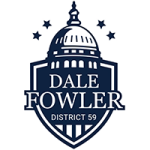Senate lawmakers will return to the Capitol on March 5 to continue to resume spring session. In the meantime, State Senator Dale Fowler (R-Harrisburg) returned to District to host another round of Mobile Office Hours in Benton.
The next Mobile Office Hours event will be held at the Vienna City Hall on March 4 from 12 to 2 p.m. Area constituents are encouraged to come out to these events to speak with the Senator and ask their questions.
“These events have been a great success so far, giving me the opportunity to speak one-on-one with area constituents and getting firsthand feedback on the issues happening within our communities,” said Senator Fowler. “I was elected to be a voice to the people of the 59th Senate District, and it is critical that they have every opportunity to vocalize their concerns, speak to staff and know that their lawmakers are representing their interests.”
The Vienna City Hall is located at 205 North 4th Street.
In other news, Senator Fowler joined the Vienna Grade School 8th grade class for a conversation about state government on Feb. 27. Senator Fowler spoke with students about his role and responsibilities as a lawmaker for Southern Illinois.
Senator Fowler also addressed the attendees and honorees at this year’s Egyptian Region Student Recognition Breakfast, noting the importance of giving back to the community and dedicating themselves to their goals. This year’s breakfast, hosted by the Illinois Principals Association, took place in Mt. Vernon. The event is about celebrating students, encouraging future leaders and recognizing their achievements.
Finally, Senator Fowler joined administrators and other guests for the unveiling of the new Saluki logo on Feb. 28. The new logo features a Saluki dog and will be the official logo for the school’s athletes.
State News
Ratings agencies critical of Pritzker budget, pension plan
Several ratings agencies tasked with monitoring the fiscal health of Illinois have given poor marks to Illinois Governor J.B. Pritzker’s budget proposal, noting a dependence on one-shot revenues, an uncertain pension proposal and punting on real fiscal progress.
Late last week, S&P Global Ratings issued a statement saying the plan’s reliance on nearly $1.3 billion in new revenue “precariously balances the current budget, but punts measures to address fiscal progress to future years.”
Fitch Ratings warned the proposed budget could lead to yet another downgrade for Illinois, saying “The fiscal 2020 executive budget plan recently introduced by Illinois’ governor would not materially address the state’s structural budget issues in the current fiscal year or the next.”
Fitch advised that the plan, “relies heavily on non-recurring revenues and large savings from an uncertain pension proposal that poses risks for the state.” An analyst also noted about one-third of the new revenue sources contained in the budget are one-shot revenues.
S&P raised concerns that the Governor’s plan for long-term stability “hinges largely on a tough campaign to pass a progressive income tax that requires a constitutional amendment.” A progressive income tax is a non-starter for many Senate Republican lawmakers who view plans to implement such a structure as a tax hike on middle-class families.
“This revenue stream is far from certain, and there is no detail yet on rates, brackets, or the amount of revenue it is supposed to generate,” S&P cautioned. “Despite the potential for a more collaborative budget process with single-party control of state government, Illinois has yet to prove its ability to make politically difficult decisions in favor of structural balance and sustainability. If it adopts the budget in its current form, it remains at risk of repeating a pattern of putting off hard choices while eroding pension funding.”
Senate Republicans have said this proposal must be a starting point for further negotiation, urging Gov. Pritzker to make good on his promises to work across the aisle to tackle the issues facing Illinois.
Illinois property taxes remain among the highest in nation
Illinois has once again ranked among the most expensive states for property owners in a new report from WalletHub. According to WalletHub’s latest analysis of state property taxes, Illinoisans pay the second-highest rates in the nation.
In Illinois, property taxes ring in at around $4,476, nearly double the national average of $2,280. The Prairie State’s property tax rates are in stark contrast with neighbors like Iowa, Indiana and Missouri where the averages paid are $2,960, $1,679 and $1,910, respectively.
Senate Republican lawmakers have long advocated for reforms to lower Illinoisans’ property tax burdens.

